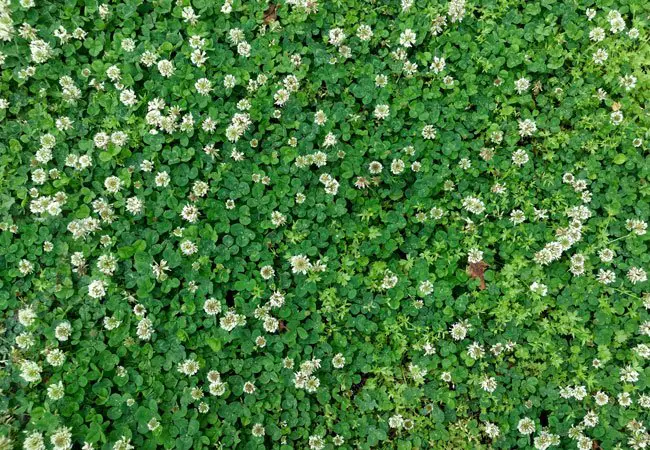
Whenever we come across a four leaf clover, the inner child in us is filled with glee. They are quite rare, and it is easier to come across a clover with three leaves. There are people that do not mind them in their grass. They sometimes feel like a carpet beneath the feet.
But finding a clover with three leaves in your lawn can at times be disappointing, especially if you did not anticipate it would be there. They can be extremely hard to eliminate, especially when you do not want to use chemical means.
So what causes clover to grow?
Clover has a tendency to occur in nitrogen deficient soils, and it is an automatic indicator that your soil needs a nitrogen boost. It is a legume, meaning that it can get nitrogen from naturally occurring air. It has no need, therefore, to be in soils that are nitrogen-rich.
Nitrogen deficiency can happen due to several reasons. Some of them are:
- Over irrigation – A lot of water tends to wash away nitrogen and other nutrients from the soil. Areas that flood or receive more water end up with little to no nitrogen which causes the clover to grow.
- Low temperatures – During the cooler seasons, most microbes become inactive and unable to increase the levels of nitrogen in the soil. This allows the clover to multiply before your grass reaches the peak of its growth.
- Poor soils – Poor aeration and lack of proper top dressing contribute to low levels of nitrogen. To determine the state of your soil, have a lab test done, collecting soils at random patches. Using a quality compost mix can be helpful in replenishing the levels of nitrogen in the soil. It can, however, take several years before it fully recovers.
- Lack of nutrients – Denying your soil nitrogen-rich fertilizer causes it to deteriorate over time. Chemical fertilizers, however, are not ideal. They tend to leach away very quickly and they cause further deterioration. Organic fertilizers have a tendency to release their nutrients quite slowly, making them ideal for adding the nitrogen into the soil.
- Low soil pH – Good soil has a pH of 6.5, indicating that it is slightly acidic. If it becomes more acidic than this, delicate plants find it hard to thrive. Clover is, however, able to withstand this kind of pH.
Ridding your Lawn of Clover Naturally – What is the best method?
There are a number of methods that you can use to rid your lawn of clover without using chemicals and other means that can cause further deterioration to your soils. Here are a few of the best.
Fertilizing your soil

Applying fertilizer to your soils goes a long way in replenishing the levels of nitrogen. Being a legume, clover has no need for growing in soils that are nitrogen-rich. However, the use of chemical fertilizers over time will cause more harm than good. Go for organic fertilizer, especially the slow releasing kind.
Organic fertilizer can be animal based, plant based or mineral based. Animal based fertilizer can come from pig manure, cow manure or even animal by-products such as bone meal, fish meal or blood meal.
It can also be plant based and can be obtained from corn meal, sea weed, kelp, soy meal and also grass clippings.
Mineral fertilizer can be obtained from Epson salt and rock phosphorus.
Covering it with a plastic sheet
This method is also referred to as ‘cooking’ the weed. It involves covering the area on which the clover is spread with a plastic sheet. Being impermeable, this sheet prevents the clover from breathing and also causes an increase in temperature. This combination ‘cooks’ the clover and causes it to eventually die off.
The bag should ideally be black so as to keep even the sunlight away, depriving it of the ability to photosynthesize. If possible, place heavy stones on the area to deny it any chance of growth. Ensure that there is no grass in the patch as it would also die along with the clover.
Increasing the height of mowing

This allows you to be able to reach far down into the depth of the plant. It is, however, almost impossible to cut the clover down to its stalks and if this is the case, it only becomes a temporary solution. The clover sprouts afresh after some time, making it something you may have to do over time.
Home-made weed killer
Yes, you read right. There are a good number of us that have reservations regarding the use of chemicals. They tend to damage the soil and other vegetation as well. You can make home-made weed killer using vinegar and dish soap.
The vinegar sips through the surface of the leaf and causes it to dry. The added dish soap ideally has no effect on the weed, but it makes the vinegar hold a little longer on the leaves so that it can have an effect.
Remember that this weed killer is not specific to clover and will cause devastation to all plants it comes into contact with. Be careful not to spray it over plants you want to keep.
Plucking

This method is probably the most natural of them all. All you have to do is remove the clover from the ground using your hands. The reason why it is the most effective is that it takes the plant out right from the root, meaning that it will not propagate again.
It is most ideal for small patches, but it is not to mean that it cannot be done for large sections. All you need is a little patience.
Other methods that can be applied
Here are some other methods that you can use for ridding your lawn of clover.
- Constant watering
- Treating the clover with corn gluten
- Seeking the services of professional weed controllers
Final verdict
The clover is a beautiful plant and it makes for a nice carpet where it is wanted. Getting rid of it can be quite a menace, and it may need a bit of patience to succeed. Using natural methods is most ideal as it ensures the safety of your grass and other vegetation. If it persists, however, consider seeking the help of professionals.


